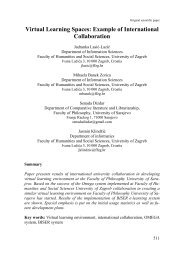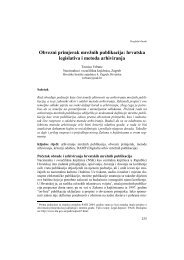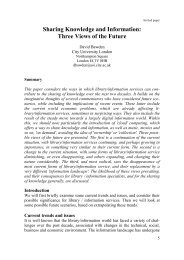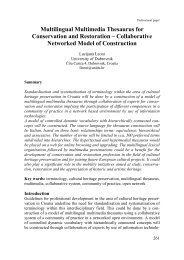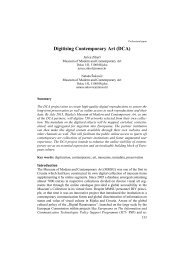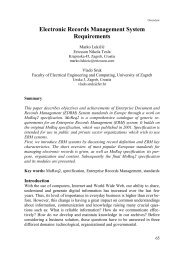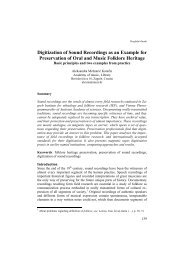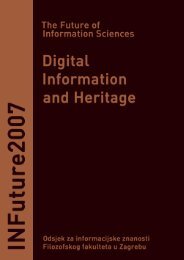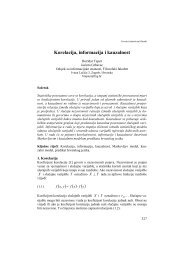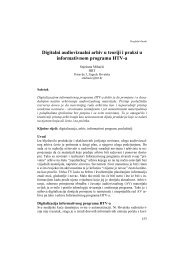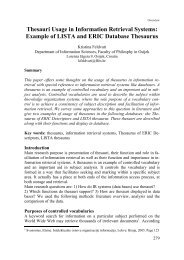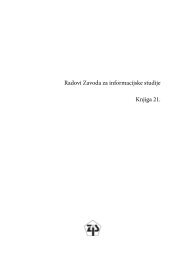Slovenian Biographical Lexicon ? From a Digital Edition to an On ...
Slovenian Biographical Lexicon ? From a Digital Edition to an On ...
Slovenian Biographical Lexicon ? From a Digital Edition to an On ...
Create successful ePaper yourself
Turn your PDF publications into a flip-book with our unique Google optimized e-Paper software.
INFuture2009: “<strong>Digital</strong> Resources <strong>an</strong>d Knowledge Sharing”<br />
This architecture, in spite of its relative simplicity, has allowed us <strong>to</strong> construct a<br />
flexible <strong>an</strong>d efficient user interface. In general, all the context information has<br />
become clickable or otherwise accessible through simple links, making the<br />
browsing interface extremely powerful. But the true power of the implementation<br />
comes from its search interface.<br />
Search <strong>an</strong>d Query Interface<br />
Fedora Commons provides a simple integrated search system, capable of simple<br />
searches on Dublin Core metada ta <strong>an</strong>d object properties, but a much more<br />
powerful system, Fedora Generic Search, is available. The power of this system<br />
derives from the fact that is simply provides native Fedora Commons interfaces<br />
between <strong>an</strong> external search system <strong>an</strong>d Fedora Commons API.<br />
In our application, we have chosen <strong>to</strong> implement Fedora Generic Search on <strong>to</strong>p<br />
of SOLR, a search system based on Apache Lucene search <strong>an</strong>d indexing library.<br />
In this set-up, Lucene library c<strong>an</strong> use Fedora Commons API <strong>to</strong> index the document<br />
contents, using specially crafted rules (in the form of XSLT stylesheets) <strong>to</strong><br />
break up the documents in a number of searchable text fields, <strong>an</strong>d the reposi<strong>to</strong>ry<br />
gains a search interface with full power of Lucene query l<strong>an</strong>guage (cf. Hatcher,<br />
Gospodnetic 2004), while SOLR takes over the interface <strong>an</strong>d formatting of<br />
query results in <strong>an</strong> easy-<strong>to</strong> parse XML list.<br />
The power of the interface has been most useful while crafting special queries,<br />
such as the context links for different SBL article features, but due <strong>to</strong> the complexity<br />
involved in the use of the flexible Lucene query l<strong>an</strong>guage, this is hardly<br />
the optimal solution for the average user of the system.<br />
To solve this problem, we have implemented two use search interfaces: the<br />
simple search is targeted by default at the most often requested fields, namely<br />
the subjects’ names, places of their birth <strong>an</strong>d death, <strong>an</strong>d their occupation descriptions.<br />
This interface in fact accepts the full Lucene syntax, so it c<strong>an</strong> be used<br />
both for simple searches by general users <strong>an</strong>d for complex queries by adv<strong>an</strong>ced<br />
users.<br />
The secondary interface c<strong>an</strong> be accessed by a click on <strong>an</strong> exp<strong>an</strong>sion but<strong>to</strong>n. It<br />
presents a form with several fields that easily enable <strong>an</strong> average user <strong>to</strong> compose<br />
even fairly complex queries, selecting different indexed fields <strong>an</strong>d even<br />
using adv<strong>an</strong>ced features such as full-text searches, proximity searches, number<br />
or date r<strong>an</strong>ges, fuzzy searches etc. This interface is implemented by a secondary<br />
script that parses the form <strong>an</strong>d converts its data in<strong>to</strong> a single Lucene query<br />
string. Our initial testing with users has been reasonably successful: it makes it<br />
trivial <strong>to</strong> find, for example, female writers, who lived <strong>an</strong>d worked in the period<br />
between 1830-1860 in Ljublj<strong>an</strong>a, or priests, who were also philosophers <strong>an</strong>d<br />
born in Maribor etc.<br />
The same system c<strong>an</strong> be used for experimental research on the data, especially<br />
if one w<strong>an</strong>ts <strong>to</strong> <strong>an</strong>alyse the particularities of the original SBL publication. It is<br />
now easy <strong>to</strong> compare, for example, the average length of articles with the num-<br />
258


